Since the 1970s, the feminist movement has been repeating a slogan that is more relevant today than ever: We women keep the world afloat!
This slogan clearly and simply captures some of the key ideas and concepts of the feminist economy: it asserts the existing fundamental relationship between the economy’s productive and reproductive areas; it champions the contributions made by domestic, reproductive and care work to sustaining life and the whole of society; and it denounces the situation of inequality and discrimination that women experience for having assumed the task of social reproduction, which encompasses an entire set of duties that are carried out mostly unpaid, with employment precariousness and a lack of social rights.
The data you will find in this section bear testimony to the unjust conditions in which care work is provided in our society. They confirm the truth behind the claim that we women keep the world afloat. The analysis we present here is based on the research work entitled Care economy and municipal policy: towards a democratisation of care work in Barcelona, conducted between September 2015 and December 2016. The report was compiled from the analysis of sources and different documents on the care economy and from in-depth interviews with people receiving or providing care who are linked to municipally run community spaces, facilities and projects, and professionals and other workers from the realm of the family.
We can confirm that responsibility for care work in our society falls to a very small number of people, who are mainly from the family environment and in most cases women: wives, daughters-in-law, mothers, sisters and daughters. A wholly insufficient and unsatisfactory care-provision model, where the main carer role is not freely chosen by the people fulfilling it and where the contributions made by the public administration and community spaces are still insignificant. A system that has a very negative impact on the personal trajectory of carers whose physical and mental health, personal and professional careers and present and future financial situations are negatively affected by this work overload.
Care work in numbers
Care work in numbers
Identifying care work as an inherently female responsibility has a negative impact on women's health, conditions, trajectories and quality of life.
Women devote twice as many hours as men to their homes and families every week

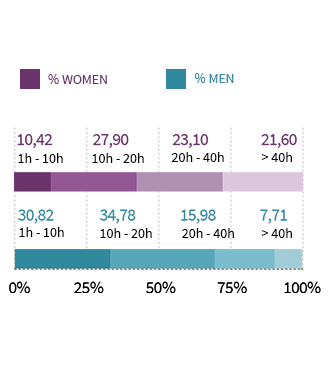
The average daily time women spend on family care work is 3 hours and 54 minutes compared to 2 hours and 2 minutes for men. This situation is exacerbated for heterosexual couples with children under their care, where there is a two-hour difference between the time dedicated to such work by men and women. The feminisation of care work forces many women to either work at home or to work part-time, making them the group with the greatest need for rights to balance family life with work.
Women are the main carers at every stage of the life cycle

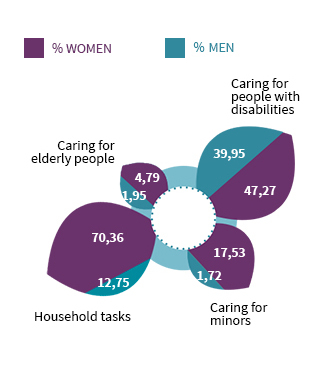
Women are not only the people who are mainly responsible for carrying out daily domestic chores (in 70.36% of cases), but they are also the principal carers of children and the elderly. They are also the ones taking responsibility for dealing with specific care situations related to illness, disability and restricted functional independence (47.27%).
Three times more women do part-time work than men

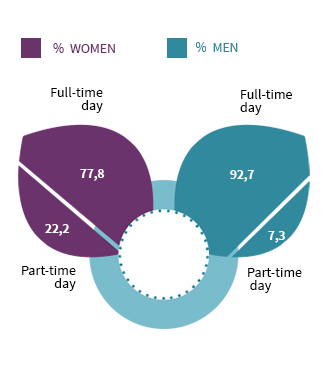
Only 7.3% of employed men work part time compared to 22.2% of women. This type of employment, besides being less well remunerated during the period of employment also has medium- and long-term implications: it leads to smaller unemployment benefits and retirement pensions. Sex-related inequalities in working hours may be due as much to sexist employment practices as to women's renunciation of greater labour participation to care for third parties.
The gender wage gap in Catalonia is 23.9%

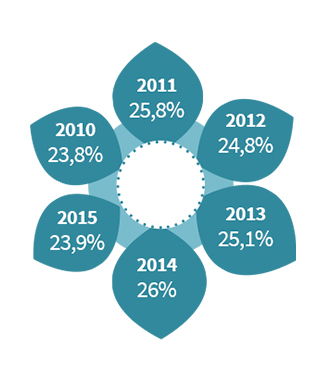
The gender wage gap in Barcelona is as high as €7,000. Wage inequalities are found in every age, nationality, educational level and professional group bracket and in almost every economic sector. Such inequalities exist not only in basic salaries, where we find an 18.6% gap, and in bonuses and incentives (36.4%), but also in extra pay for night and weekend work (almost 40%), and in overtime pay (75%).
Professional care work in Catalonia is feminised and racialised

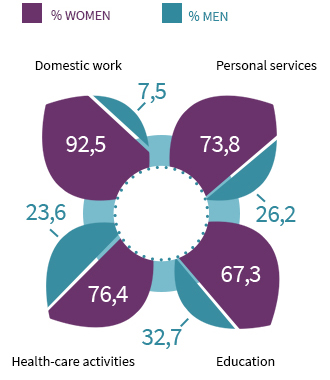
Feminisation in health and care employment activities is above 70% of the total work force; this figure rises to 92.5% for domestic work. Furthermore, 43.5% of all these women workers come from non-EU countries. Domestic work is noted for its low income and high rates of job informality and insecurity. Even where there is a contract under the special domestic-work system, this does not give employees the right to strike or to take maternity leave.
Women's perceptions of their own health are worse than men's

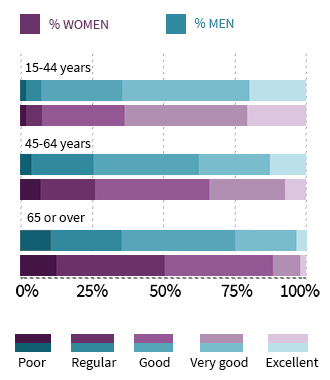
Perceived state of health is an indicator that links well-being with social factors, such as housing, work conditions and financial situation. Women usually perceive a worse general state of health than men, but those belonging to the least privileged social classes regard themselves as having poor health in 41.7% of cases, compared with just 10.6% of women from the wealthier social classes.

